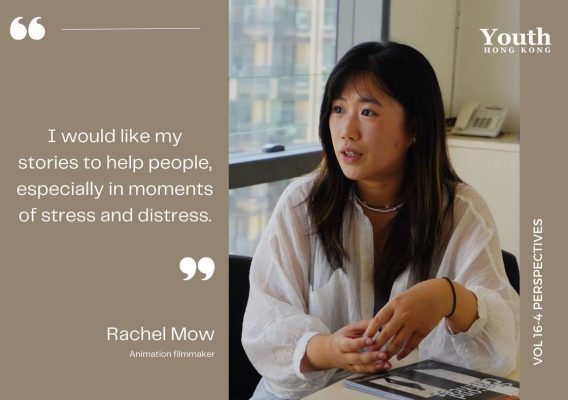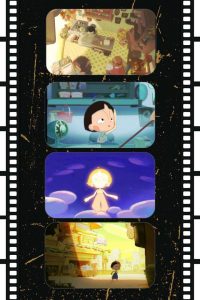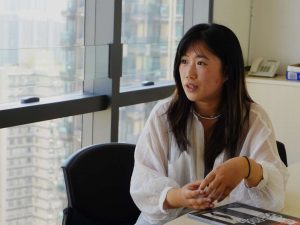//16.4 Perspectives
A professional animator is not how Rachel Mow imagined herself. Now, an award-winning animation filmmaker, she keeps looking for ways to weave her spontaneous, weird, sometimes crazy, thoughts into unique stories.
When she was young, Rachel spent time with her mother watching the animations of Hayao Miyazaki with little idea of ending up as a career animator herself. “I thought of becoming a nurse,” she recollects, “until I realised that I could never do what nurses do!” So, deciding to follow her talent and affection for drawing, she enrolled at the Savannah College of Art and Design (SCAD).
The SCAD Hong Kong campus was shut down in 2020 at the height of the pandemic, so Rachel left to go to the US campus in Savannah, Georgia. Her initial interest was in illustration, but she realised that animation offered more chance of diversification and collaboration. It provided her room to explore everything, from video editing and prop design to the animation process itself. “I love the teamwork involved in creating animated films,” she says, remembering the entire year it took a team of 11 to complete The Sun is Bad.
The Sun Is Bad, is a three-minute animated short, set in the 1980s in Hong Kong, about a little girl trying to fight the sun with her toys as the city melts around her.
The three-minute film is a story set in late 1980s Hong Kong and draws on her own experience of growing up in the city’s suffocating summer heat. “We included subtle nods to Hong Kong icons, like the now sunken Jumbo floating restaurant and vintage umbrella stores. I saw this as a way of honouring and preserving Hong Kong’s fading heritage.”
Creating animations has its challenges, Rachel says. Factors including economic pressures, technological advancements and evolving market demands, especially post-Covid, made it harder to work in the industry. Even major companies like Pixar and DreamWorks had layoffs and reduced their workforce due to financial constraints.
Hong Kong animation today faces similar dilemmas due to high production costs. Even though the animation industry here is small, it is comprised of passionate creators. Rachel acknowledges the help of the Hong Kong Animation Support Programme (HKASP) where animators can pitch their ideas to receive funding, even if it is often not enough to cover production costs. Further financial challenges are the high cost of living, which makes renting studio space and investing in essential software difficult.
Practical concerns, like earning a living and job security, have seen many young people move to more stable careers. Art, according to Rachel, is seen more as a luxury and animators don’t gain enough respect or support. Furthermore, Hong Kong people don’t always recognise local talents, favouring international works, especially from Japan. The way to change this, she believes, is for the government and other support to showcase local talents in order to build appreciative audiences.
Rachel is thinking of moving to Vancouver to gain more experience and seek new opportunities. Yet at the same time, she is not against the future prospect of moving back to Hong Kong, working in a small studio and creating more shorts through the HKASP. By then, she hopes, more support, recognition and appreciation, might be forthcoming.
Rachel is still excited about making animated films as she tries to find her own voice in storytelling. “I would like my stories to help people,” she says, especially in moments of stress and distress. “I want my work to offer them a moment to calm down, to give them a place where they might slow down, take a breath and experience something meaningful.” ■




